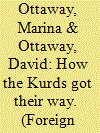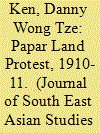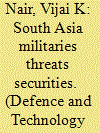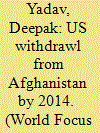| Srl | Item |
| 1 |
ID:
130475


|
|
|
|
|
| Publication |
2014.
|
| Summary/Abstract |
The surge of ethnic and sectarian strife in Syria and across the Middle East has led a number of analysts to predict the coming breakup of many Arab states. This potential upending of the region's territorial order has come to be known as "the end of Sykes-Picot," a reference to the secret 1916 Anglo-French agreement to divide up the Middle Eastern provinces of the Ottoman Empire into British and French zones of control. Because the European treaties that created new Arab states in the aftermath of World War I upheld the outlines of that agreement, Sykes-Picot became the convenient shorthand for the map that colonial powers imposed on the region, one that has remained essentially constant to the present day.
With bloodshed from Aleppo to Baghdad to Beirut, it is indeed tempting to predict the violent demise of Sykes-Picot. But although the worst fighting is spilling over borders and pushing some countries, such as Syria, toward fragmentation, there is another force crossing national lines and even realigning national relationships: trade. New transnational zones of economic cooperation are making Middle Eastern borders more porous, but in a way that does not directly challenge existing states. Instead, mutual economic interests, especially in the oil and gas industries, may signal a softer end to Sykes-Picot.
|
|
|
|
|
|
|
|
|
|
|
|
|
|
|
|
| 2 |
ID:
117477


|
|
|
|
|
| Publication |
2012.
|
| Summary/Abstract |
One of the recurring problems that emerged during the height of European expansion into Southeast Asia was the encroachment of European enterprises into indigenous lands. In most cases, problems existed especially in the manner that landholdings were understood by the natives vis-à-vis the new land laws introduced by the colonial powers. This often led to disputes which resulted in the natives being deprived of their rights. This paper looks into a case where the Dusun in Papar, North Borneo - an indigenous people - took the European colonial government to court over land rights which involved land encroachments by European enterprises and railways. The event took place barely 30 years after the first contact with European civilisation took place. The paper will examine the nature of the case and also investigate the role played by the Dusun and their fight against the government. The paper will also investigate the role of an English lawyer retained by the Dusun for the case, and that of the Roman Catholic Mission in championing the affairs of the indigenous people.
|
|
|
|
|
|
|
|
|
|
|
|
|
|
|
|
| 3 |
ID:
129360


|
|
|
|
|
| Publication |
2012.
|
| Summary/Abstract |
South Asia comprises all countries from Pakistan in the West; Afghanistan in the North; Myanmar to the East; and the Indian Ocean on the south. Countries that till recently, were ruled by colonial powers that imposed their own brand of governance in keeping with their interests rather than those of the native people. It was only as recently as the mid-20th century that these nations shed the colonial yoke and started to develop indigenous means of governance (monarchical, democratic, autocratic, or totalitarian) as behooved historical national systems. These countries fell into the category of 'developing nations.' Unlike the more advanced western colonial powers, the agricultural and industrial revolutions in South Asia came about simultaneously and as late as the mid-20th century accompanied by the phenomenal socioeconomic turbulence that affected governance and its evolution in the 'developing nations.'
|
|
|
|
|
|
|
|
|
|
|
|
|
|
|
|
| 4 |
ID:
123387


|
|
|
|
|
| Publication |
2013.
|
| Summary/Abstract |
Afghanistan has always played a very crucial role in the Asian and world politics and acted as playground for the 'Great Game'. Due to its unique geographical location and presence of abundant natural resources, controlling of Afghanistan has been a long cherished dream for the colonial powers in the past. In the nineteenth century, Afghanistan served as a 'strategic buffer' state between Czarist Russian and the British Empire in the subcontinent. Afghanistan's relations with Moscow became more cordial after the Bolshevik Revolution in 1917.
|
|
|
|
|
|
|
|
|
|
|
|
|
|
|
|